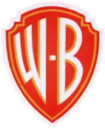
Back وارنر براذرز كارتونز Arabic وارنر براذرز کارتونز AZB Warner Bros. Cartoons Catalan Warner Bros. Cartoons Spanish Warner Bros. Cartoons French Warner Bros. Cartoons Portuguese Warner Bros. Cartoons Turkish 华纳兄弟卡通 Chinese
This article currently links to a large number of disambiguation pages (or back to itself). (October 2024) |
 Final logo, used from 1944 to 1948 and from 1953 to 1964. | |
| Formerly | Leon Schlesinger Productions (1932–1944) |
|---|---|
| Company type | Private |
| Industry | Animation Motion pictures |
| Predecessor | Harman-Ising Productions |
| Founded | June 1932[1] |
| Founder | Leon Schlesinger |
| Defunct | May 1963[2] |
| Fate | Closed |
| Successors | DePatie–Freleng Enterprises (1964–1980) Warner Bros.–Seven Arts Animation (1967–1969) Chuck Jones Enterprises (1970–2000) Warner Bros. Animation (1980–present) |
| Headquarters | Los Angeles, California, U.S. (1932–1956) Burbank, California, U.S. (1956–1963) |
Key people | Leon Schlesinger, Edward Selzer, Friz Freleng, Chuck Jones, Mel Blanc, John W. Burton Sr., David H. DePatie, William L. Hendricks, Robert McKimson, Tex Avery, Bob Clampett, Arthur Davis, Frank Tashlin |
| Products | Animated theatrical short subjects Television shows |
| Parent | Warner Bros. (1944–1963) |
Warner Bros. Cartoons, Inc. was an American animation studio, serving as the in-house animation division of Warner Bros. during the Golden Age of American animation. One of the most successful animation studios in American media history, it was primarily responsible for the Looney Tunes and Merrie Melodies series of animated short films. The characters featured in these cartoons, including Bugs Bunny, Daffy Duck, and Porky Pig, are among the most famous and recognizable characters in the world. Many of the creative staff members at the studio, including directors and animators such as Chuck Jones, Friz Freleng, Robert McKimson, Tex Avery, Robert Clampett, Arthur Davis, and Frank Tashlin, are considered major figures in the art and history of traditional animation.
Warner Bros. Cartoons was founded in 1933 by Leon Schlesinger as Leon Schlesinger Productions. Schlesinger sold the studio to Warner Bros. in 1944, after which the Warner Bros. Cartoons name was adopted. The studio closed in 1963, and Looney Tunes and Merrie Melodies were subsequently subcontracted to Freleng's DePatie–Freleng Enterprises studio from 1964 to 1967. Warner Bros. Cartoons re-opened that year, under Warner Bros.-Seven Arts, before closing again in 1969. It was succeeded by Warner Bros. Animation, which was established in 1980.
- ^ Barrier (1999); p. 324
- ^ Warner Club News (1963)